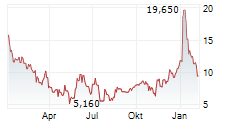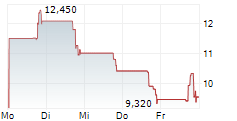PBFT02 continued to demonstrate robust, durable elevation in CSF PGRN levels and improvement in plasma NfL, a disease progression biomarker, compared to natural history
Dose 2, 50% lower than Dose 1, substantially increased CSF PGRN levels at 30-days, reaching the upper limit of a healthy adult reference range
Plan to amend upliFT-D protocol to include a prophylactic course of low dose anticoagulation and modify inclusion criteria to study patients earlier in disease progression
Remain on track to seek regulatory feedback on FTD-GRN pivotal trial design in 1H 2026
PHILADELPHIA, June 23, 2025 (GLOBE NEWSWIRE) -- Passage Bio, Inc. (Nasdaq: PASG), a clinical stage genetic medicines company focused on improving the lives of patients with neurodegenerative diseases, today reported updated data from the ongoing Phase 1/2 upliFT-D clinical trial evaluating PBFT02 for the treatment of frontotemporal dementia (FTD) with granulin (GRN) mutations and provided program updates and anticipated milestones.
"We are pleased to share updated data highlighting the promise of PBFT02 for the frontotemporal dementia community. These data continue to demonstrate the ability of our investigational, one-time gene therapy to elevate progranulin, the deficient protein in FTD-GRN, in a robust and durable manner while also reducing the rate of increase of plasma neurofilament levels compared to rates observed in natural history studies," said Will Chou, M.D., president and chief executive officer of Passage Bio. "In addition, we continue to refine our understanding of the safety profile of PBFT02 and believe that our planned changes to the study protocol will further optimize the benefit-risk profile of the program. We remain on track to engage with regulatory authorities on a future registrational trial design in the first half of 2026."
Updated interim data from FTD-GRN patients treated with PBFT02:
Cerebrospinal Fluid (CSF) Progranulin (PGRN)
- Dose 1 PBFT02 treatment resulted in a robust and durable increase in CSF PGRN expression through 18 months post-treatment.
- Dose 1 PBFT02 increased CSF PGRN expression in all patients from below 3 ng/mL at baseline to a mean of 12.4 ng/mL at one month (n=7), 19.4 ng/mL at six months (n=6), 25.9 ng/mL at 12 months (n=4), and 23.8 ng/mL at 18 months (n=2).
- CSF PGRN levels for the first patient treated with Dose 2 PBFT02 (50% of Dose 1) increased substantially from 1.5 ng/mL at baseline to 7.6 ng/mL at one month, approaching the upper limit of a healthy adult reference range.
Plasma Neurofilament (NfL)
- Patients who received Dose 1 PBFT02 experienced a reduced annual rate of change of plasma NfL compared to rates observed in natural history studies.
- Plasma NfL levels increased by 4% on average (n=4) at 12 months post-treatment compared to an expected increase of 28% and 29% per year in untreated symptomatic FTD-GRN patients based on analysis of the ALLFTD natural history data (n=11) and published natural history data (n=15)1, respectively.
Safety (as of June 15, 2025)
- In five of eight patients, all treatment emergent adverse events were mild to moderate in severity.
- Three of eight patients experienced a total of four serious adverse events (SAEs). As previously disclosed, Patients 1 and 7 experienced a total of three asymptomatic SAEs: venous sinus thrombosis (n=2) and hepatotoxicity. The first Dose 2 patient (Patient 8) experienced the SAE of pulmonary embolism in the setting of a concurrent systemic infection six weeks after receiving PBFT02. The patient responded to treatment with anticoagulants, and the SAE was assessed as possibly related to treatment.
- No evidence of dorsal root ganglion (DRG) toxicity, as measured by nerve conduction studies, and no complications during intra cisterna magna (ICM) administration were observed across any of the eight treated patients.
Study Next Steps
The company plans to amend the upliFT-D clinical trial protocol to introduce a short course of low dose prophylactic anticoagulation, a decision supported by study investigators and the Independent Data Monitoring Committee (IDMC). The IDMC and U.S. Food and Drug Administration agreed that dosing of Patient 9, who previously enrolled in the study, may proceed with additional safety monitoring in place prior to amendment completion. Patient 9 will complete Cohort 2, and subsequent patients will be treated as part of Cohort 3, which is now expected to consist of five to 10 patients.
In addition, the company intends to amend study inclusion criteria to allow for enrollment of patients who are prodromal or have mild cognitive impairment and exclude patients who are more severely progressed. The company plans to submit the amended protocol to health authorities in early July. Upon review and acceptance of the amended protocol, the company plans to begin enrollment in Cohort 3 (FTD-GRN) and Cohort 4 (FTD-C9orf72).
Anticipated Milestones:
- Submit upliFT-D protocol amendment to health authorities in July 2025
- Seek regulatory feedback on suspension-based manufacturing process comparability in 2H 2025
- Report updated interim safety and biomarker data from Dose 2 in 1H 2026
- Seek regulatory feedback on registrational trial design in FTD-GRN in 1H 2026
About upliFT-D (NCT04747431)
upliFT-D is a Phase 1/2 global, multi-center, open-label clinical trial of PBFT02 administered by single injection into the cisterna magna in patients aged 35 to 75 years with FTD-GRN or FTD-C9orf72. The clinical trial will sequentially enroll three FTD-GRN cohorts and two FTD-C9orf72 cohorts. Enrollment is currently ongoing. The primary endpoint of the clinical trial is to evaluate the safety and tolerability of PBFT02. Secondary endpoints include disease biomarkers and clinical outcome measures. upliFT-D is a two-year clinical trial with a three-year safety extension.
Passage Bio is pursuing several initiatives to support clinical trial recruitment and enrollment, including a collaborative partnership with InformedDNA to provide no-cost genetic counseling and testing for adults who have been diagnosed by their physicians with FTD. More information about upliFT-D can be found here.
About PBFT02
PBFT02 is a gene replacement therapy that utilizes an AAV1 viral vector to deliver, through ICM administration, a functional GRN gene that encodes PGRN. This vector construct and delivery approach aim to elevate PGRN levels in the central nervous system to alter the course of neurodegenerative diseases. Interim clinical data from the upliFT-D Phase 1/2 study in FTD-GRN participants shows that ICM administration of PBFT02 resulted in robust PGRN elevations in the CSF.
The potential clinical benefit of PBFT02 is supported by extensive preclinical studies. In non-human primates, a single ICM administration of PBFT02 led to broad vector distribution throughout the CNS, and robust, dose-dependent elevations in PGRN levels in CSF. An NHP study also demonstrated that AAV1 was particularly proficient at transducing ependymal cells. In a murine FTD model, PBFT02 administration improved lysosomal function and reduced neuroinflammation.
About Passage Bio
Passage Bio (Nasdaq: PASG) is a clinical stage genetic medicines company on a mission to improve the lives of patients with neurodegenerative diseases. Our primary focus is the development and advancement of cutting-edge, one-time therapies designed to target the underlying pathology of these conditions. Passage Bio's lead product candidate, PBFT02, seeks to treat neurodegenerative conditions, including frontotemporal dementia, by elevating progranulin levels to restore lysosomal function and slow disease progression.
To learn more about Passage Bio and our steadfast commitment to protecting patients and families against loss in neurodegenerative conditions, please visit: passagebio.com.
Forward-Looking Statements
This press release contains "forward-looking statements" within the meaning of, and made pursuant to the safe harbor provisions of, the Private Securities Litigation Reform Act of 1995, including, but not limited to: our expectations about timing and execution of anticipated milestones, including the progress of clinical studies and the availability of clinical data from such trials; timing of feedback from regulatory authorities; our expectations about cash runway; and the ability of PBFT02 to treat FTD-GRN or FTD-C9orf72. These forward-looking statements may be accompanied by such words as "aim," "anticipate," "believe," "could," "estimate," "expect," "forecast," "goal," "intend," "may," "might," "plan," "potential," "possible," "will," "would," and other words and terms of similar meaning. These statements involve risks and uncertainties that could cause actual results to differ materially from those reflected in such statements, including: our ability to develop and obtain regulatory approval for our product candidates; the timing and results of preclinical studies and clinical trials; risks associated with clinical trials, including our ability to adequately manage clinical activities, unexpected concerns that may arise from additional data or analysis obtained during clinical trials, regulatory authorities may require additional information or further studies, or may fail to approve or may delay approval of our drug candidates; the occurrence of adverse safety events; the risk that positive results in a preclinical study or clinical trial may not be replicated in subsequent trials or success in early stage clinical trials may not be predictive of results in later stage clinical trials; failure to protect and enforce our intellectual property, and other proprietary rights; our dependence on collaborators and other third parties for the development and manufacture of product candidates and other aspects of our business, which are outside of our full control; risks associated with current and potential delays, work stoppages, or supply chain disruptions; and the other risks and uncertainties that are described in the Risk Factors section in documents the company files from time to time with the Securities and Exchange Commission (SEC), and other reports as filed with the SEC. Passage Bio undertakes no obligation to publicly update any forward-looking statement, whether written or oral, that may be made from time to time, whether as a result of new information, future developments or otherwise.
For further information, please contact:
Investors:
Stuart Henderson
Passage Bio
shenderson@passagebio.com
Media:
Mike Beyer
Sam Brown Inc. Healthcare Communications
312.961.2502
MikeBeyer@sambrown.com
1 Saracino et al, J Neurol Neurosurg Psych 2021; 92:1278-1288.



